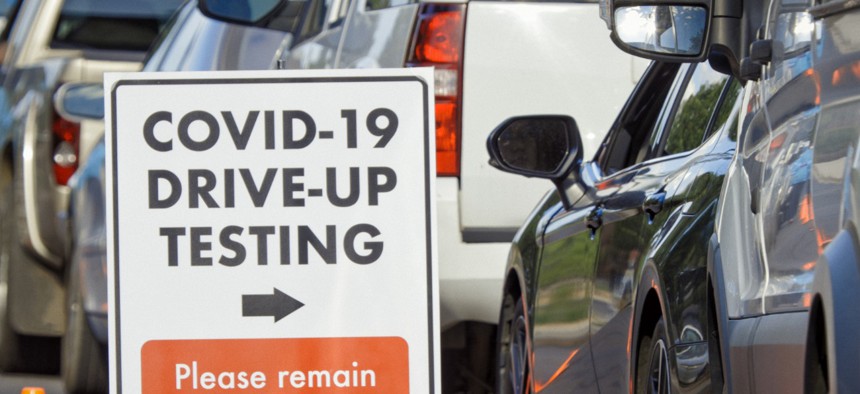
Hoptocopter / istock
Coronavirus Roundup: IGs Suggest Improvements for Testing; Administration to Send More Resources to Michigan
Here’s today’s list of news updates and stories you may have missed.
President Biden’s fiscal 2022 discretionary federal budget proposal, released on Friday, includes $131.7 billion for the Health and Human Services Department, which is 23.5% more than the department received for fiscal 2021. “COVID-19 shed light on how health inequities and lack of federal funding left communities vulnerable to crises,” said HHS Secretary Xavier Becerra in a statement. “The president’s funding request invests in America, addresses racial disparities in health care, tackles the opioid crisis, and puts us on a better footing to take on the next public health crisis.” Public health and equity are key focuses of the proposal overall. Here are some of the other recent headlines you might have missed.
As coronavirus cases spike in Michigan, the federal government will rush resources to the state to support vaccinations, testing and treatments, but it will not provide additional vaccines, The Associated Press reported on Friday. Michigan Gov. Gretchen Whitmer asked for more doses, but the state reportedly hasn’t yet used the vaccine allocations already authorized by the federal government. Also, administration officials say that more vaccines won’t be immediately effective in curbing the spread of the virus. “Biden told Whitmer that his administration stands ready to send an additional 160 federal Emergency Management Agency and [Centers for Disease Control and Prevention] personnel to Michigan to assist in vaccinations, on top of the 230 federal personnel already deployed to the state to support pandemic response operations,” said the report. “He’s also directing the administration to prioritize the distribution of doses through federal channels, like the retail pharmacy program and community health centers, to areas of the state Whitmer identifies.”
Michigan is not the only state slow to order allocated vaccine doses, The Washington Post reported. “At one point last week, 13 states had more than 100,000 doses apiece available and not ordered, according to a federal official familiar with the figures,” the Post reported. State and county officials have given varied reasons for the delays, which have led federal officials to reconsider the approach to distribution but new strategies “would need sign-off from the White House, which has been at pains to avoid the appearance of penalizing some states while boosting others, including by directing additional doses to virus hot spots.”
Jeff Zients said during a briefing on Friday FEMA would be opening new mass vaccination sites in Tulsa, Oklahoma, and Baton Rouge, Louisiana. He noted that on March 29 Biden challenged his team to open at least 12 new federally run mass vaccination sites by April 19 and “we’ve brought nine online in the last 10 days.”
Brian Harrison, former chief of staff to former HHS Secretary Alex Azar, is running for Congress on a “Trump-branded platform” for a special election in Texas’ 6th congressional district, Politico reported on Monday. “Harrison has drawn fire from a separate swath of former health officials for running on his authorship of deregulatory moves that deepened divisions between HHS and health agencies under its umbrella, like the Food and Drug Administration and the Centers for Disease Control and Prevention.”
Rep. James Clyburn, D-S.C., chairman of the House Select Subcommittee on the Coronavirus Crisis, released new evidence on Friday that indicates a Trump appointee bragged about interfering with CDC reports. The focus is on Dr. Paul Alexander, former HHS senior advisor, who has been the subject of previous reports of political influence in the Trump administration's coronavirus response and for trying to push a controversial herd immunity strategy.
Christi Grimm, acting HHS inspector general, and Michael Horowitz, Justice IG and chair of the Pandemic Response Accountability Committee, offered recommendations for improving coronavirus testing in an article for CNN. Their suggestions involve investing in public health infrastructure, incentive payment structures for labs to produce quick results, ensuring payments for testing is “economical” and using “more and better multi-dimensional demographic data (including race and ethnicity)” to “inform policy decisions that target testing efforts and help further monitor public health in disproportionately impacted groups.”
In the United States, nine in 100 people have had the coronavirus, compared to 34 in 100 for incarcerated individuals. The rate is even higher in the federal prison population, as at least 39% have been infected, according to an analysis by The New York Times about how the pandemic overwhelmed the nation’s prison systems.
Upcoming: White House Press Secretary Jen Psaki will give a briefing at 12:15 p.m.
Help us understand the situation better. Are you a federal employee, contractor or military member with information, concerns, etc. about how your agency is handling the coronavirus? Email us at newstips@govexec.com.
NEXT STORY: Pandemic Anxiety Has Women Drinking More







